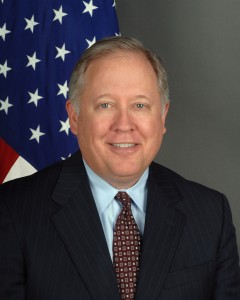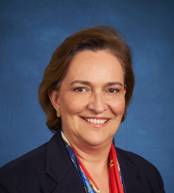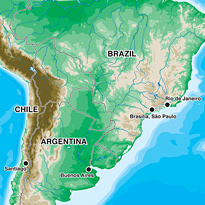Brazil without borders
President McRobbie’s trip across South America officially began this morning in Brasilia, the capital and seat of the federal government of Brazil. We chose to start in Brasilia for one specific purpose: to gain a better understanding of the higher education environment and the government’s new programs to incentivize student and faculty mobility between the U.S. and Brazil.
 In our first meeting of the day, U.S. Ambassador Thomas Shannon contextualized some of the challenges that Brazil will face in the coming years as it continues to rapidly progress. Unlike other developing countries, Brazil has the significant benefit of internal social stability and lack of threats regionally and internationally. Infrastructure and education, however, are two areas of particular weakness that government officials will need to address in the coming years to ensure continued growth and opportunities for its citizens. Brazilian President Dilma Rousseff has already started to take some initial steps toward improving higher education with strategic investments in new higher education initiatives. Among these is the Brazil Science Mobility Program (formerly Science without Borders), a public-private partnership that will fund 101,000 students from the STEM (science, technology, engineering, and mathematics) disciplines to study in another country for one year. The program has also allocated funds to support the mobility of doctoral students, researchers, and professors. The goal of the program, as Ambassador Shannon explained, is to promote change within higher education: when students and faculty members return to Brazil, they will bring with them new ways of thinking about curricula, pedagogy, research, facilities, administrative structures, and perhaps most importantly, the important role of international study in the preparation of Brazil’s future professionals and leaders.
In our first meeting of the day, U.S. Ambassador Thomas Shannon contextualized some of the challenges that Brazil will face in the coming years as it continues to rapidly progress. Unlike other developing countries, Brazil has the significant benefit of internal social stability and lack of threats regionally and internationally. Infrastructure and education, however, are two areas of particular weakness that government officials will need to address in the coming years to ensure continued growth and opportunities for its citizens. Brazilian President Dilma Rousseff has already started to take some initial steps toward improving higher education with strategic investments in new higher education initiatives. Among these is the Brazil Science Mobility Program (formerly Science without Borders), a public-private partnership that will fund 101,000 students from the STEM (science, technology, engineering, and mathematics) disciplines to study in another country for one year. The program has also allocated funds to support the mobility of doctoral students, researchers, and professors. The goal of the program, as Ambassador Shannon explained, is to promote change within higher education: when students and faculty members return to Brazil, they will bring with them new ways of thinking about curricula, pedagogy, research, facilities, administrative structures, and perhaps most importantly, the important role of international study in the preparation of Brazil’s future professionals and leaders.
 Later in the morning, President McRobbie met with Dr. Denise Neddermeyer, Director of International Affairs of CAPES, a national foundation for the development of highly trained personnel, linked to the Brazilian Ministry of Education. Dr. Neddermeyer explained in greater detail the various components of the Brazil Science Mobility Program, including the often-neglected opportunity for non-Brazilian professors and researchers to apply for funding through CAPES to spend time conducting research or teaching at an institution of higher education in Brazil. The conversation also focused on the continued issue of English language proficiency for students in the program who do not meet the minimum qualifications for admission to universities abroad. President McRobbie and Vice President Zaret talked about IU’s expertise in the area of second language acquisition and shared that they would explore the potential participation of IU to assist in this area as part of the recently signed agreement between CAPES and the Committee on Institutional Cooperation (CIC), of which IU is a member. Beyond the Science Mobility Program, Dr. Neddermeyer also talked about other funding opportunities on the horizon to support mobility of Brazilian students in the creative industries, an important initiative to boost the skills of young professionals to meet the country’s needs of the 21st century.
Later in the morning, President McRobbie met with Dr. Denise Neddermeyer, Director of International Affairs of CAPES, a national foundation for the development of highly trained personnel, linked to the Brazilian Ministry of Education. Dr. Neddermeyer explained in greater detail the various components of the Brazil Science Mobility Program, including the often-neglected opportunity for non-Brazilian professors and researchers to apply for funding through CAPES to spend time conducting research or teaching at an institution of higher education in Brazil. The conversation also focused on the continued issue of English language proficiency for students in the program who do not meet the minimum qualifications for admission to universities abroad. President McRobbie and Vice President Zaret talked about IU’s expertise in the area of second language acquisition and shared that they would explore the potential participation of IU to assist in this area as part of the recently signed agreement between CAPES and the Committee on Institutional Cooperation (CIC), of which IU is a member. Beyond the Science Mobility Program, Dr. Neddermeyer also talked about other funding opportunities on the horizon to support mobility of Brazilian students in the creative industries, an important initiative to boost the skills of young professionals to meet the country’s needs of the 21st century.
As we move on to Rio de Janeiro this evening, we will transition to meetings on Tuesday with the Fluminense Federal University and FGV, as well as one particularly significant event: the signing of an agreement with the prestigious Brazilian Academy of Letters.


